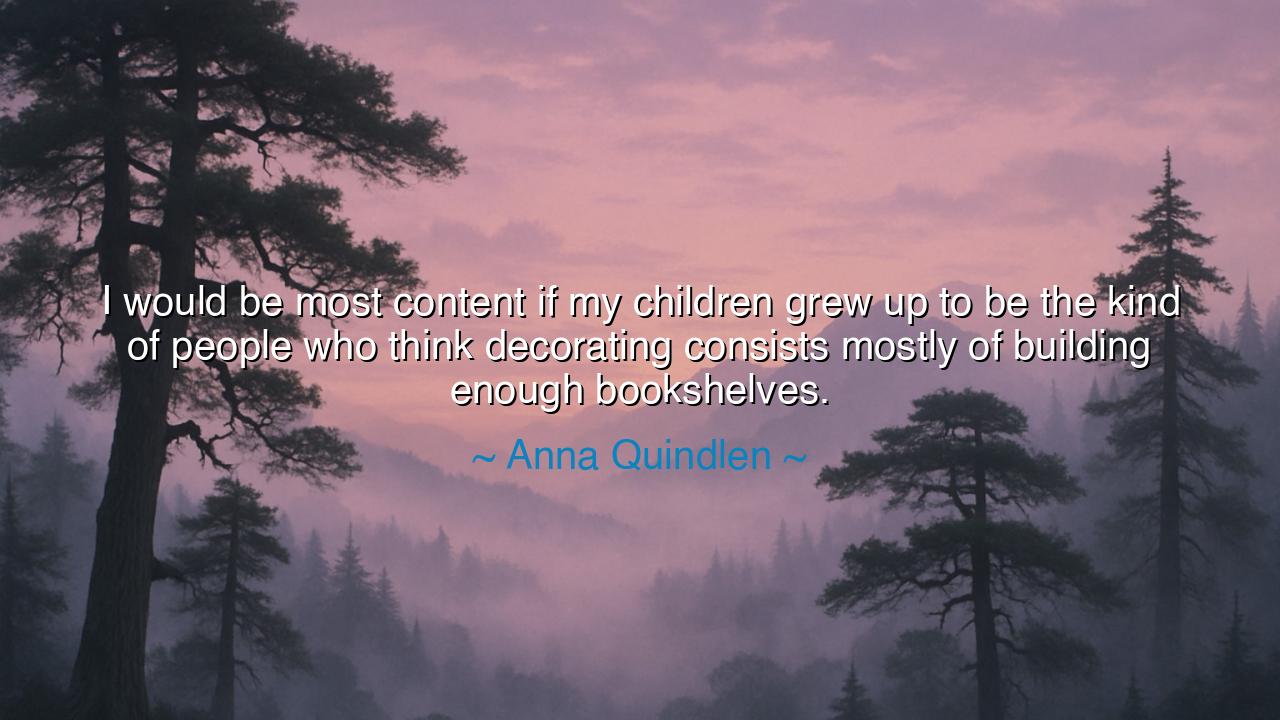
I would be most content if my children grew up to be the kind of
I would be most content if my children grew up to be the kind of people who think decorating consists mostly of building enough bookshelves.






"I would be most content if my children grew up to be the kind of people who think decorating consists mostly of building enough bookshelves." – Anna Quindlen
In this tender yet profound reflection, Anna Quindlen speaks not merely as a mother, but as a philosopher of the heart. When she said, “I would be most content if my children grew up to be the kind of people who think decorating consists mostly of building enough bookshelves,” she was not talking about furniture, but about values — the deep architecture of the soul. To her, the bookshelf was not a structure of wood, but a symbol of curiosity, knowledge, and imagination. It was an altar to learning, a sanctuary for wisdom, a declaration that beauty is found not in adornment, but in understanding.
The origin of this quote lies in Quindlen’s lifelong love of reading and her belief in the transformative power of books. As a writer and mother, she lived in a world filled with stories — real and imagined — and she understood that every great civilization, every enduring family, is built not upon wealth or luxury, but upon ideas. To her, a home filled with books was not cluttered, but alive. Each spine on the shelf was a voice — whispering lessons of courage, compassion, laughter, and truth. Thus, her wish for her children was not that they inherit riches, but that they inherit the hunger to learn.
For Quindlen, decorating with bookshelves meant adorning one’s life with thought. In a time when many measure success by the glitter of possessions, she pointed to a quieter form of wealth — the wealth of the mind. To fill one’s home with books is to proclaim to the world that one values growth over glamour, depth over display. The ancients would have understood this well, for in every temple of wisdom — from the Library of Alexandria to the halls of ancient monasteries — beauty was born from knowledge, and decoration was but the echo of understanding.
Consider the story of Thomas Jefferson, the scholar-president who once declared that he could not live without books. When the Library of Congress was destroyed by fire during the War of 1812, Jefferson offered his personal library — thousands of volumes — to rebuild it. To him, a house without books was a body without soul. His home, Monticello, was not lavish with gold, but radiant with ideas. Every wall was lined with shelves, every shelf a reflection of his restless curiosity. He too, like Quindlen, knew that to decorate with books was to decorate with spirit.
This wisdom runs deep: books are gateways to empathy. They invite us into the lives of others, teach us to see beyond our own narrow world. A person surrounded by books is surrounded by humanity itself — by saints and sinners, dreamers and rebels, poets and scientists. To raise children who love books is to raise citizens of the world — people who seek truth, who question power, who understand before they judge. It is to plant in them the seeds of discernment, so that when they face the noise and illusion of the world, they may return to the quiet wisdom that lives between the pages.
Yet Quindlen’s quote carries not only aspiration but also warning. In a world increasingly drawn to the superficial — to fleeting trends and glittering surfaces — the bookshelf stands as a rebellion against emptiness. To fill a home with books is to declare that meaning still matters, that thought still has a place, that the interior life — unseen, quiet, sacred — is the truest form of beauty. The ancients knew that the richest home was not the one with the finest marble, but the one with illumination in the mind.
So let this teaching take root in the hearts of those who build homes and families today. Do not decorate for admiration, but for inspiration. Build shelves not just for books, but for dreams. Fill your children’s hands not merely with devices, but with words that shape their souls. Let them grow up believing that beauty lies in learning, and that a home filled with stories is a home filled with light. For when the years pass and the fashions fade, the shelves will remain — steady, silent, shining — bearing witness to a family that understood what it means to live richly: to live among ideas, imagination, and the endless pursuit of wisdom.






AAdministratorAdministrator
Welcome, honored guests. Please leave a comment, we will respond soon